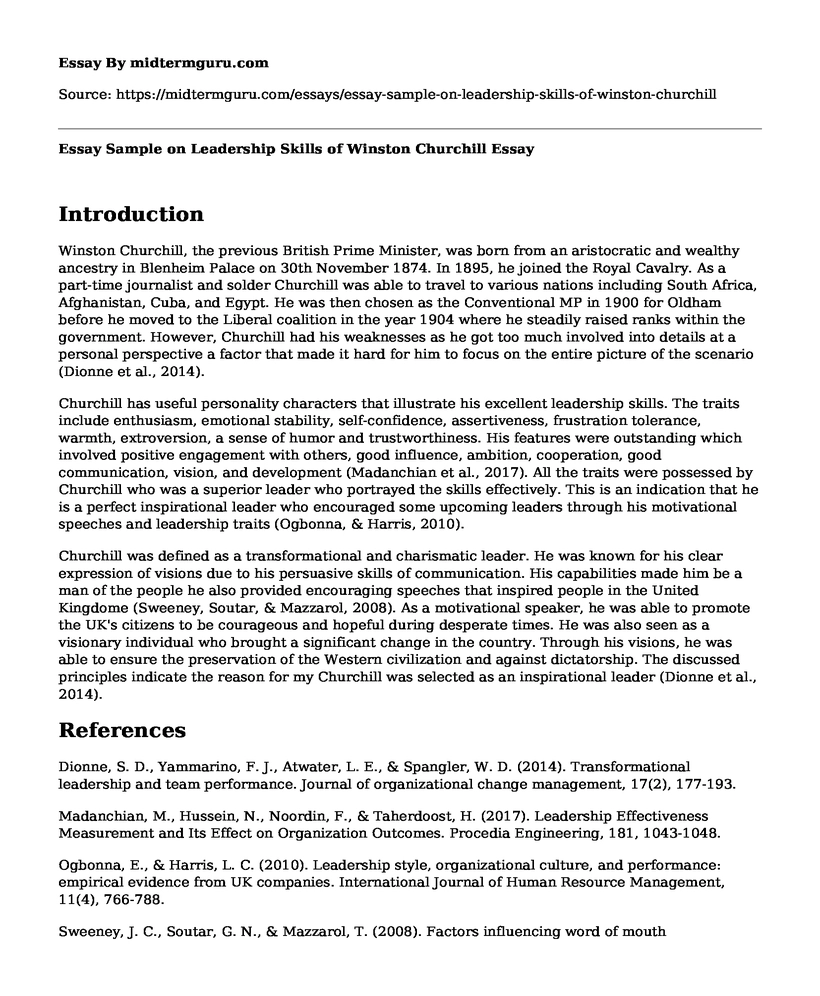Introduction
Winston Churchill, the previous British Prime Minister, was born from an aristocratic and wealthy ancestry in Blenheim Palace on 30th November 1874. In 1895, he joined the Royal Cavalry. As a part-time journalist and solder Churchill was able to travel to various nations including South Africa, Afghanistan, Cuba, and Egypt. He was then chosen as the Conventional MP in 1900 for Oldham before he moved to the Liberal coalition in the year 1904 where he steadily raised ranks within the government. However, Churchill had his weaknesses as he got too much involved into details at a personal perspective a factor that made it hard for him to focus on the entire picture of the scenario (Dionne et al., 2014).
Churchill has useful personality characters that illustrate his excellent leadership skills. The traits include enthusiasm, emotional stability, self-confidence, assertiveness, frustration tolerance, warmth, extroversion, a sense of humor and trustworthiness. His features were outstanding which involved positive engagement with others, good influence, ambition, cooperation, good communication, vision, and development (Madanchian et al., 2017). All the traits were possessed by Churchill who was a superior leader who portrayed the skills effectively. This is an indication that he is a perfect inspirational leader who encouraged some upcoming leaders through his motivational speeches and leadership traits (Ogbonna, & Harris, 2010).
Churchill was defined as a transformational and charismatic leader. He was known for his clear expression of visions due to his persuasive skills of communication. His capabilities made him be a man of the people he also provided encouraging speeches that inspired people in the United Kingdome (Sweeney, Soutar, & Mazzarol, 2008). As a motivational speaker, he was able to promote the UK's citizens to be courageous and hopeful during desperate times. He was also seen as a visionary individual who brought a significant change in the country. Through his visions, he was able to ensure the preservation of the Western civilization and against dictatorship. The discussed principles indicate the reason for my Churchill was selected as an inspirational leader (Dionne et al., 2014).
References
Dionne, S. D., Yammarino, F. J., Atwater, L. E., & Spangler, W. D. (2014). Transformational leadership and team performance. Journal of organizational change management, 17(2), 177-193.
Madanchian, M., Hussein, N., Noordin, F., & Taherdoost, H. (2017). Leadership Effectiveness Measurement and Its Effect on Organization Outcomes. Procedia Engineering, 181, 1043-1048.
Ogbonna, E., & Harris, L. C. (2010). Leadership style, organizational culture, and performance: empirical evidence from UK companies. International Journal of Human Resource Management, 11(4), 766-788.
Sweeney, J. C., Soutar, G. N., & Mazzarol, T. (2008). Factors influencing word of mouth effectiveness: receiver perspectives. European journal of marketing, 42(3/4), 344-364.
Cite this page
Essay Sample on Leadership Skills of Winston Churchill. (2022, Aug 18). Retrieved from https://midtermguru.com/essays/essay-sample-on-leadership-skills-of-winston-churchill
If you are the original author of this essay and no longer wish to have it published on the midtermguru.com website, please click below to request its removal:
- Economic Changes in Saudi Arabia and the Government 2030 Vision
- Tesco PLC Analysis Paper Example
- Changes in Strategy and Strategic Direction Over the Last Ten Years of Thai Union
- Hashtag Activism Essay Example
- Paper Example on Leadership Style and Organizational Culture
- Democracy in the Contemporary World: The Role of Media - Essay Sample
- Local Content Policies: Building Capacity for Positive Change - Essay Sample







